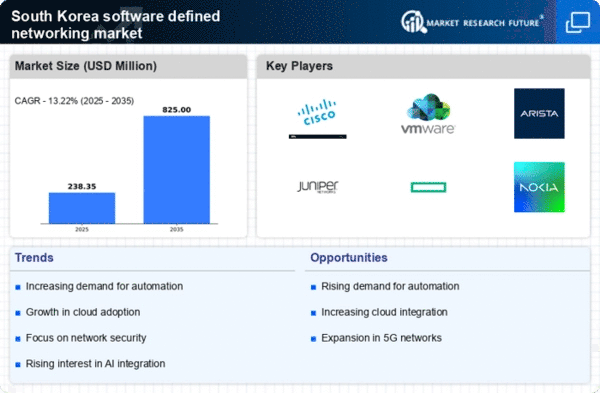Emergence of 5G Technology
The rollout of 5G technology is poised to have a transformative impact on the The software defined networking market is intensifying due to the growing need for enhanced network management.. With the promise of higher speeds and lower latency, 5G is expected to drive demand for more flexible and scalable networking solutions. Software defined networking can facilitate the integration of 5G infrastructure, enabling operators to manage resources dynamically and efficiently. As South Korea continues to lead in 5G deployment, the software defined-networking market is likely to experience substantial growth, with projections indicating a potential increase in market size by over 40% in the coming years.
Rising Demand for Network Agility
The The software defined networking market is experiencing a notable surge in demand for network agility. is experiencing a notable surge in demand for network agility. Organizations are increasingly seeking solutions that allow for rapid deployment and reconfiguration of network resources. This shift is driven by the need for businesses to adapt quickly to changing market conditions and customer demands. According to recent data, the agility offered by software defined networking can reduce deployment times by up to 50%. As companies strive for operational efficiency, the software defined-networking market is positioned to benefit significantly from this trend, as it enables seamless integration of various network components and enhances overall performance.
Government Initiatives and Support
The South Korean government is actively promoting the adoption of advanced networking technologies, including software defined networking. Various initiatives aim to enhance the country's digital infrastructure, which is expected to bolster the software defined-networking market. For instance, the government has allocated substantial funding to support research and development in this area, with investments reaching approximately $200 million in recent years. This support not only encourages innovation but also fosters collaboration between public and private sectors, creating a conducive environment for the growth of the software defined-networking market.
Increased Focus on Cost Efficiency
Cost efficiency remains a critical driver for the The software defined networking market is driven by cost efficiency.. Organizations are increasingly recognizing the potential of software defined networking to reduce operational costs associated with traditional networking solutions. By leveraging virtualization and automation, companies can optimize resource utilization and minimize hardware expenditures. Reports indicate that businesses can achieve cost savings of up to 30% by transitioning to software defined networking. This financial incentive is likely to propel further adoption, as organizations seek to streamline their operations and enhance their competitive edge in the market.
Growing Need for Enhanced Network Management
As networks become more complex, the demand for enhanced network management solutions is intensifying within the software defined-networking market. Organizations in South Korea are seeking tools that provide greater visibility and control over their network environments. Software defined networking offers centralized management capabilities, allowing IT teams to monitor and manage network performance more effectively. This trend is underscored by the increasing volume of data traffic, which necessitates sophisticated management solutions. The software defined-networking market is thus poised to grow as businesses prioritize efficient network management to ensure optimal performance and reliability.
















